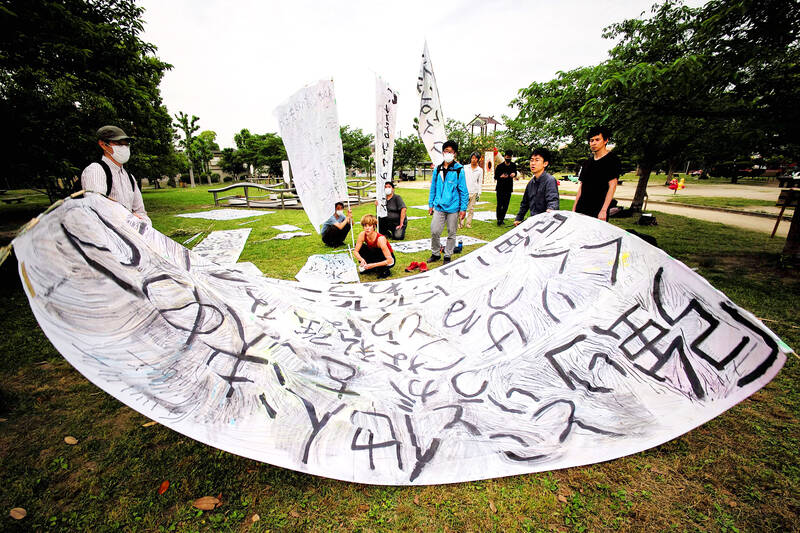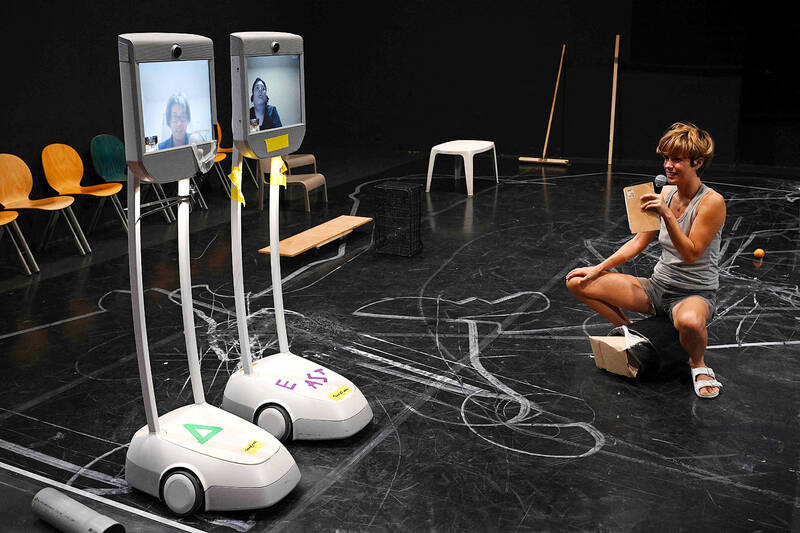Disillusioned by work and tired of life, Seiji Yoshida withdrew from the world for seven years, but now he’s taking part in a play about the experiences of Japan’s hikikomori, or social recluses.
The 42-year-old spent most of his thirties shut inside his home.
“I was going through the motions of life, but lying to myself. Apart from work, I had nothing. I’d just had enough,” he said at a workshop for the international production.

Photo: AFP
Yoshida was among more than a million Japanese aged 15 to 64 who lead highly reclusive lives, withdrawing from all social contact for at least six months, according to a 2020 government estimate.
Through an experimental theater project, two French artists are hoping to offer hikikomori — or “shut-ins” as they are often referred to in English — a chance to express themselves and regain self-confidence.
Their play Hiku — to be shown next year in France, Belgium and elsewhere in Europe — aims to give hikikomori a platform for self-expression, while respecting their desire for isolation.

Photo: AFP
It features robots controlled by participants at home in Japan and voice recordings of conversations held through bedroom doors.
It also includes footage from small but noisy street demonstrations staged by hikikomori who are taking steps towards leaving their confinement — but who feel oppressed by Japan’s demanding work culture.
“We don’t want to be forced to work! Stop oppressing us!” participants chanted at one demonstration filmed in the city of Takatsuki in western Japan.

Photo: AFP
Yoshida, who took part in the protest, said he was “very proud” to be part of the theater production.
‘ROBOT AVATARS’
The producers are working in Takatsuki with a local organization, New Start Kansai, which provides support and company for hikikomori to help them gradually readjust to life in society.
“It’s a social problem... but society has made (hikikomori) believe that the problem comes from them,” said Atsutoshi Takahashi, a mediator at the association.
Nicolas Tajan, a psychoanalyst and associate professor at Kyoto University, said hikikomori often faced difficulties in childhood.
In Japan, “childhood and adolescent psychological difficulties are not addressed and not treated,” he said. “That means in adulthood it can crystallize into a type of social withdrawal.”
As adults, they face additional problems as they “are looked down on because they don’t work,” he added, noting that “work is really a very important part of Japanese identity.”
Around a dozen recovering hikikomori are taking part in the project.
Some will control robots from 10,000km away during the play, painting messages on the floor and talking to spectators through microphones.
The robots are “a sort of avatar” to explore “being present and absent at the same time, a recurring theme for hikikomori,” said co-director Eric Minh Cuong Castaing, a visual artist and dancer.
He hopes the production will help audiences reflect on their own lives, arguing that while hikikomori are sometimes regarded as weak, their actions represent a kind of resistance to being “a soldier in a suit and tie.”
‘PREJUDICES’
When the French artists began researching the project in Japan, they took time to build connections with the isolated people introduced to them by New Start Kansai.
“It was a big challenge for some of them to let us into their homes and speak to us,” said co-director Anne-Sophie Turion, who will perform in the play as a narrator.
She said being strangers from another country may have made things easier, “because the usual prejudices weren’t there.”
“We found people who we felt closer to than we ever could have imagined.”
Recovery can be difficult for hikikomori, who fear once they have withdrawn from society, they won’t be allowed back in, psychoanalyst Tajan said.
“This reinforces their avoidant behavior.”
But art can help reclusive individuals “reconnect with creativity” and envisage “another world” beyond psychiatric treatment or re-entering employment, he said.

From an anonymous office in a New Delhi mall, matrimonial detective Bhavna Paliwal runs the rule over prospective husbands and wives — a booming industry in India, where younger generations are increasingly choosing love matches over arranged marriage. The tradition of partners being carefully selected by the two families remains hugely popular, but in a country where social customs are changing rapidly, more and more couples are making their own matches. So for some families, the first step when young lovers want to get married is not to call a priest or party planner but a sleuth like Paliwal with high-tech spy

With raging waters moving as fast as 3 meters per second, it’s said that the Roaring Gate Channel (吼門水道) evokes the sound of a thousand troop-bound horses galloping. Situated between Penghu’s Xiyu (西嶼) and Baisha (白沙) islands, early inhabitants ranked the channel as the second most perilous waterway in the archipelago; the top was the seas around the shoals to the far north. The Roaring Gate also concealed sunken reefs, and was especially nasty when the northeasterly winds blew during the autumn and winter months. Ships heading to the archipelago’s main settlement of Magong (馬公) had to go around the west side

Some people will never forget their first meeting with Hans Breuer, because it occurred late at night on a remote mountain road, when they noticed — to quote one of them — a large German man, “down in a concrete ditch, kicking up leaves and glancing around with a curious intensity.” This writer’s first contact with the Dusseldorf native was entirely conventional, yet it led to a friendly correspondence that lasted until Breuer’s death in Taipei on Dec. 10. I’d been told he’d be an excellent person to talk to for an article I was putting together, so I telephoned him,

Several recent articles have explored historical invasions of Taiwan, both real and planned, in order to examine what problems the People’s Republic of China (PRC) would encounter if it invaded. The military and geographic obstacles remain formidable. Taiwan, though, is part of a larger package of issues created by the broad front of PRC expansion. That package also includes the Japanese islands of Okinawa and the Senkaku Islands, known in Taiwan as the Diaoyutai Islands (釣魚台), to the north, with the South China Sea and certain islands in the northern Philippines to the south. THE DEBATE Previous invasions of Taiwan make good objects